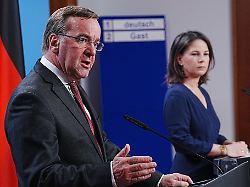In the middle of the week, the coalition will remove NATO’s two percent target from the budget law. While the government still aims to spend that much on defense, it now remains a non-binding target. Probably because she couldn’t even achieve it with the special fund.
As Chancellor Olaf Scholz three days after the Russian attack on Ukraine issued a government statement, he gave his most important speech to date. At that time he made the breath-taking announcement that he would make 100 billion euros available to the Bundeswehr in the form of a special fund. He spoke of a “turning point in time” and thus summed up the mood that was in the air. This sentence was central: “From now on we will invest more than two percent of the gross domestic product in our defense every year.”
The Federal Chancellor’s speech on the turning point of the era and the war in Europe gave new impetus to the debate on defense spending. Until then, nothing significant had happened despite the commitment to the two percent target vis-à-vis NATO partners, which was renewed in 2014. That changed now. The high point of the new enthusiasm was the plan to anchor the goal even in the budget law, as it was announced in July this year.
But now the government seems to have lost its courage. At the cabinet meeting this Wednesday, the passage from the budget law had disappeared. This was as remarkable as its presence in the original design. Because that would have impressively underpinned the German determination to actually keep the promise made. The allies in Lithuania, Estonia and Latvia would have been happy – and even more so in Washington. Instead, it remains with the non-binding commitment that Germany recently reaffirmed at the NATO summit in Vilnius.
In the coming year, Germany should achieve the goal for the first time, according to Defense Minister Boris Pistorius announced in early July – thanks to the special fund. But there are serious doubts as to whether Germany can really do it. The jump would be big: According to the IFO Institute, Germany is only spending 1.6 percent on defense in the current year, in 2022 it was only 1.4 percent – despite the rain of money. This also has to do with the fact that many major projects, such as aircraft or helicopter orders, take time before they are delivered and then paid for. Time that former defense minister Christine Lambrecht, to put it mildly, did not make optimal use of. Overall, missing the target in the initial phase is forgivable.
A household trick helps
But even in 2024, Germany will only reach the two percent with a trick. For example, the CDU budget politician Ingo Gädechens said: “The political good news that Germany will finally reach the two percent target in the coming year is a deception,” as reported a week ago by the Bayern media group. The federal government plans 51.8 billion in the defense budget for the coming year. In addition, there are 19.2 billion from the special fund. That makes a total of 71 billion euros – but according to the IFO Institute, this corresponds to only 1.7 percent of economic output. 14 billion euros were missing.
However, there is a housekeeping trick that can be used to close them, at least formally. Expenditure from other departments that also have to do with defense may be added. On this point, opposition politician Gädechens asked the government how high this sum would be. The answer: 14.5 billion euros. So even 85.5 billion would come together.
Problem solved? At least not for little girls. Because, as the government informed him in a further letter, it is not yet clear exactly how this sum is made up. “The federal government itself admits that it currently does not know how the 85.5 billion euros it proclaimed for defense in 2024 will be made up of,” the newspapers quoted Gädechens as saying. “But you already know that it’s 85.5 billion euros, which means that all ministries must now collect any expenses until the total is reached,” said the CDU politician. He fears that the expenses charged will not be sufficiently related to defense. In any case, it is important to take a close look when these figures are published.
What if the money is gone?
But such arithmetic games will no longer help when the special assets, which have already melted away due to high inflation, have been used up. This is expected to be the case in 2028. Chancellor Olaf Scholz, Defense Minister Boris Pistorius and Finance Minister Christian Lindner have all said that the two percent target should still be met. For this, considerably more money would have to flow into the actual defense budget. It is clear that the leaps must then be larger than the 1.7 billion by which the defense budget is to grow in the coming year. Does that really happen? In any case, it would be a long way to get there.
According to the Reuters news agency, it was the Foreign Office that was against the passage in the budget law. The current legal situation is considered sufficient there. In the national security strategy and in the law on the special fund, however, the aim is only to achieve the two percent target on average over several years. This leaves room to lie underneath. It just doesn’t sound as determined as “year after year from now on,” as Scholz said on February 27 a year ago.
